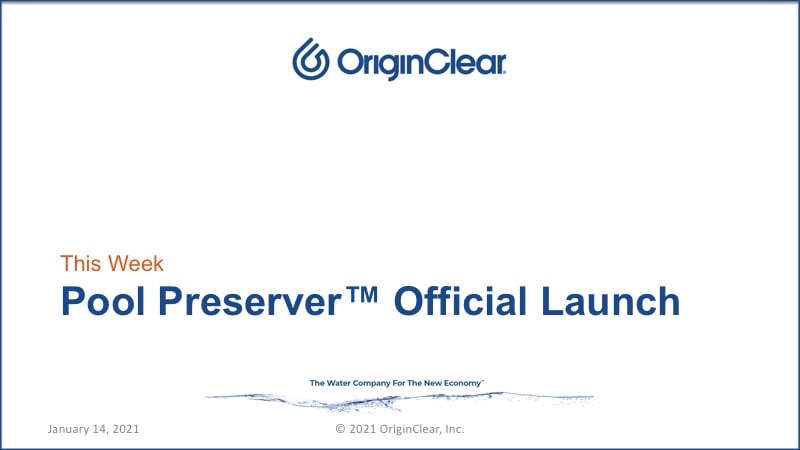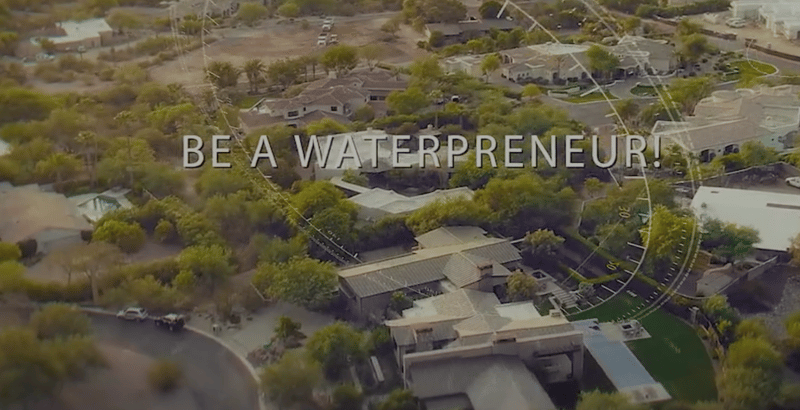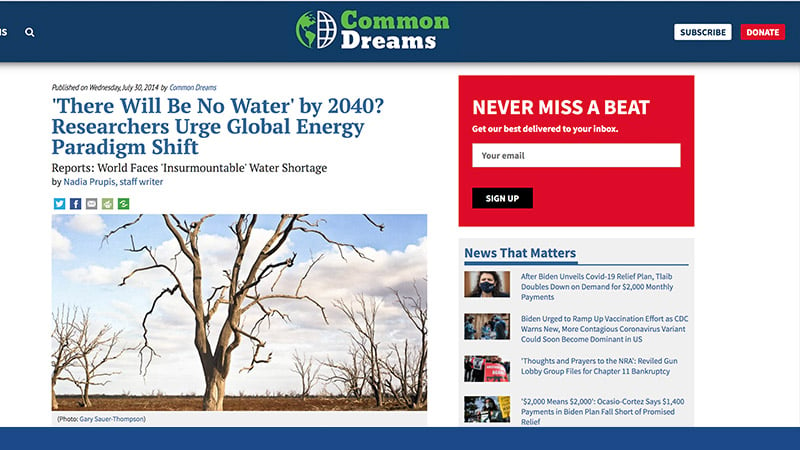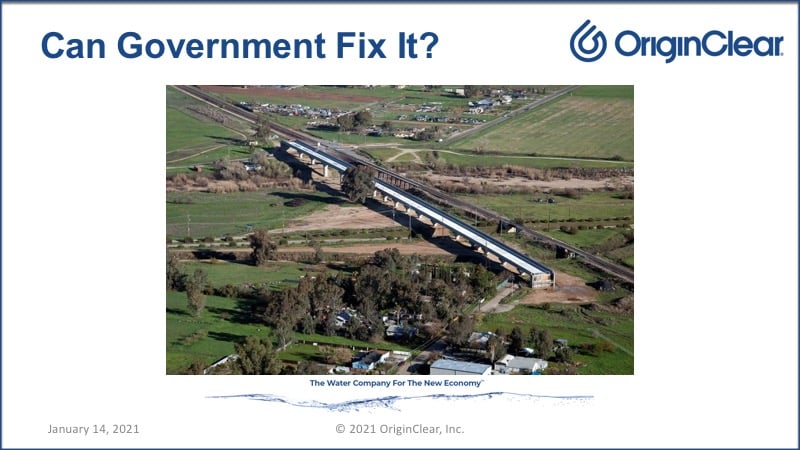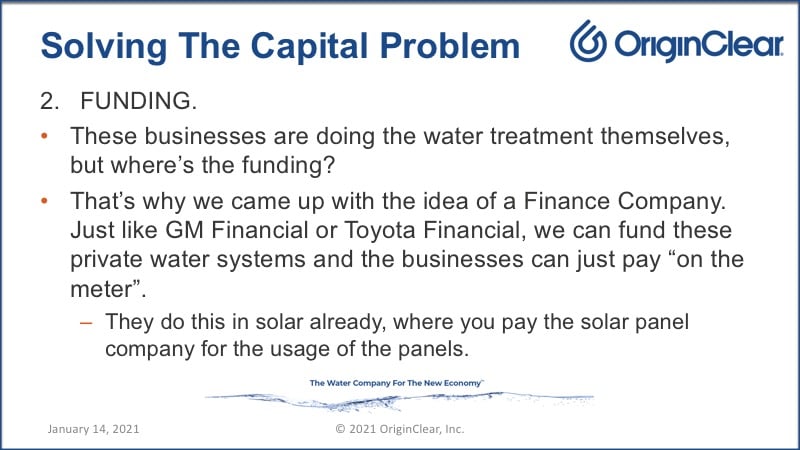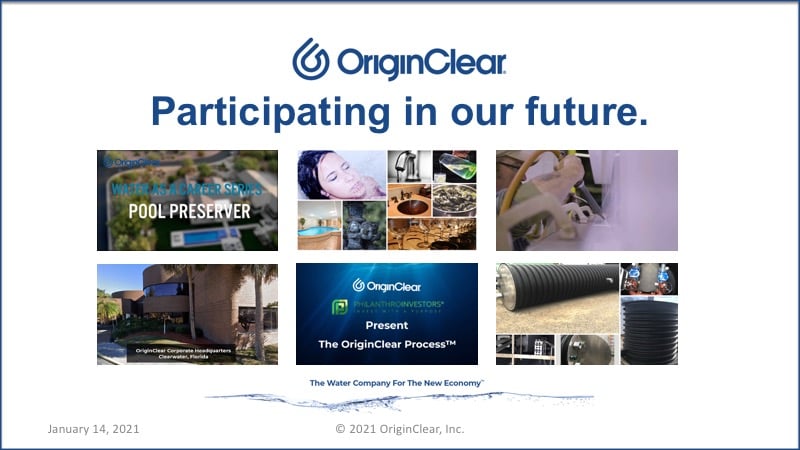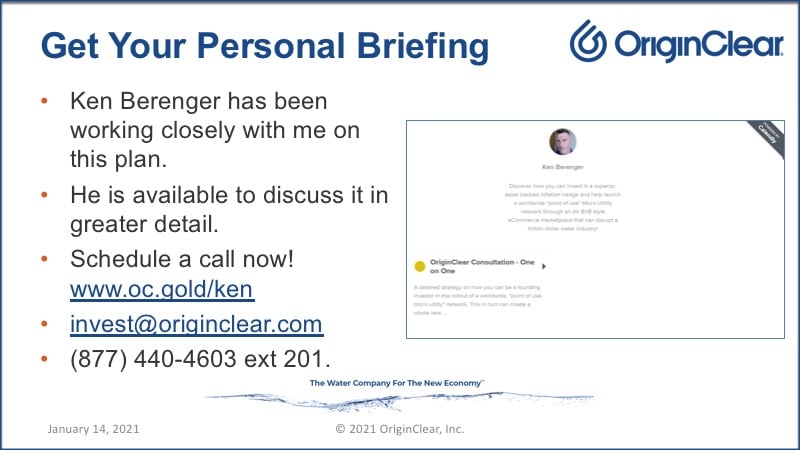Water Is The New Gold: Insider Briefing of 14 January 2021
Helping You Thrive in the World's ONLY Vital, Scarce and
Recession-Proof Market
With less than 20 years to go before major water shortages, CEO Riggs Eckelberry discusses what can be done. And, how can OriginClear become a major player in the new unbundling of water services? And what are the three major phases of our 2021 Strategy?
FEATURED OR COVERED IN THIS BRIEFING — QUICK LINKS
- Demand destruction, how it is sweepingly changing entire industries and markets and its real-time affect on water...what does it mean to OriginClear?
- Pool Preserver's official launch, its key strengths, breadth of attributes and an early look at its near future adoption potential.
- Significant drought is already taking place, when will water shortages majorly impact our planet and what can we do about it?
- A historical look at America's failing water infrastructure, the impact that it's having on us today and how OriginClear's technologies embrace and solve it.
- What unbundling is, how it is impacting the water industry and why our Water as a Career and Water as a Service initiatives are so perfectly positioned.
- The technology aspect of OriginClear's 2021 strategy and why it dominates.
- How Modular Water Systems' sales performance adds significant "bonus yields" on top of Progressive Water's stable usual.
- How becoming a "White Knight" providing easy project financing can shift the "deal-axis" and open up a whole new market space.
- What is OriginClear Financial actually and how does it relate to other existing financial entities and instruments?
- Why OriginClear Financial will create a single fund and how it leads to exportation of the company's vision to create a scalable water marketplace.
- A glimpse at OriginClear's plan for restructuring and how it plays out...
- Participating in OriginClear's future and how to get a personal briefing from Ken Berenger, the CEOs co-strategist on Water as a Career and OriginClear Financial.
- How accredited investors who are already invested in OriginClear can double their investment without investing more capital!
Transcript from recording:
Introduction
Riggs Eckelberry:
Well, hello everyone. And welcome to a very important CEO briefing as I go over the strategic picture and how we are going to achieve in 2021 the amazing promise that you all have been so excited about all these years. As I mentioned in my CEO update today, I've been writing a shareholder letter, and I've now been able to distill our basic actions. So without further ado, I am going to jump right into it.
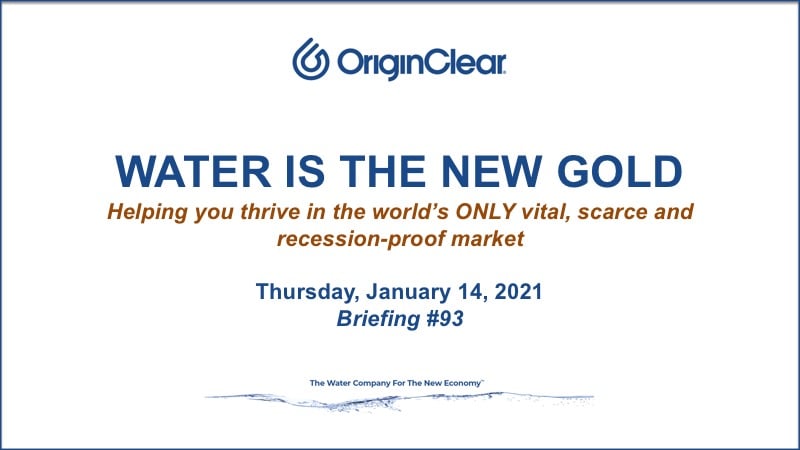
Demand Destruction
So this is Water Is The New Gold again. And there's this term called demand destruction. That is when... And we saw this a lot in 2020, literally the bottom falls out of an industry. Happened in restaurants this year, in 2020, is still happening. Oil and gas, definitely transportation fuel took a major hit, and it's a complete change for that industry. Real estate, especially commercial real estate, has been transformed. So there's a lot of small businesses — chains.
And so what happens is, is people are experiencing what used to be very stable businesses, that they could really rely on, and make a relatively small percentage every year, but it was reliable. And now the bottom fell out. And so this is very, very tough. 2021 is going to be the year of what is called the fat tail, that is the end of all this stuff. It's going to just come to hit hard.
Water is not like that. First of all, water is a very good predictor of trouble. In other words, the more trouble or pollution you have, the more water is needed, and the more disasters there are and so forth. So this is a good thing to look at, as a stable market. Now it's also in a transformation phase. And that's what we're all about. So not only is it something that's relatively immune to this demand destruction, it's also in a growth phase.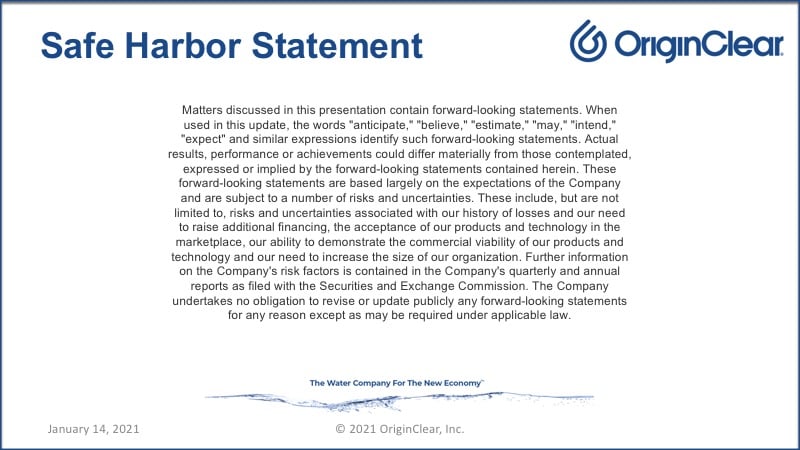
Forward Looking Statements
All right, safe harbor statement. As usual, everything we say in this presentation is qualified by various, "we believe," et cetera. And basically, we're making our very best estimation of what's going to happen. But of course, this is not prophecy.
System Clarifies Water
Okay. Before I get onto the strategic stuff, I wanted to just mention that this week we had the official launch of the Pool Preserver. Last year, as you know, we piloted doing a funding of this machine... The great machine that I'm not going to play the video, et cetera. You've seen it many times. But basically this great machine... In fact, I have the video, which I'll show you momentarily. The system has the ability to clarify water in a pool.
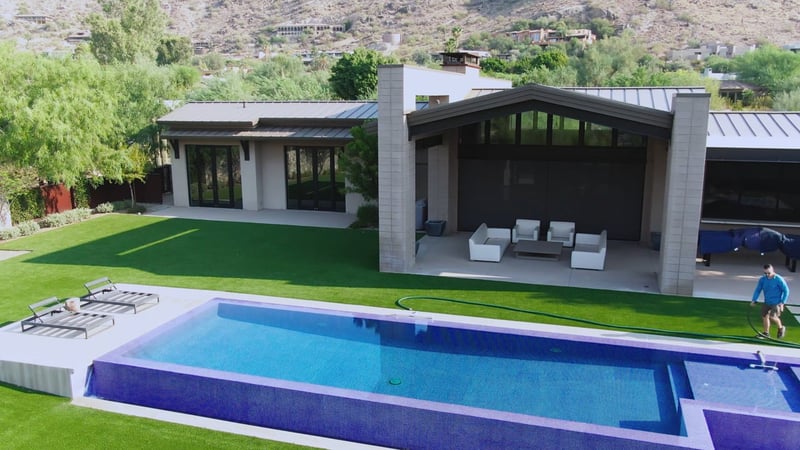 A pristine and perfectly balanced pool just purified by Pool Preserver reverse osmosis
A pristine and perfectly balanced pool just purified by Pool Preserver reverse osmosis
Handles Dissolved Solids
You say, "Well, why can't you just keep throwing chemicals?" The problem is that the TDS, the total dissolved solids, keeps growing. And so most people eventually just flush out the water. Well, that's a lot of waste and it can also damage the pool.
And so as Dwight Barber learned, the guy who piloted this, and who later worked with us on this rollout and helped our pioneer Pool Preserver user Ryan Kooistra; he found that it's a great way to enhance a business, and the pool cleaning business, and also is great for the entrepreneurs affected by COVID to get a new industry.
So that's been rolling. And in fact, we'll be having some very good news on Pool Preserver sales. They've already launched. And we have some six figure sales happening of Pool Preserver right now.
Save a Million Gallons
So we've got a whole career building system and, technologically, it's a great piece of technology, because it very efficiently removes the, as I said, the total dissolved solids, and there's a huge number for Phoenix, for example, a hundred pool owners would save a million gallons of drinking water, and that's a heck of a lot of water.
Water as a Career™
Okay, so there's a cool page. And the team did a good job on this. Here we go, Pool Preserver. And this is the Pool Preserver page, where it shows us all the benefits of it and so forth. And then you'll be able to access, very soon, the Waterpreneur Academy™, which teaches people.
Okay, I'm very pleased with the team. Tom Marchesello is getting sales. Dan Early did the technical. Alan Wallace did the marketing with Kevin Pruett and Ashton Sanders' on the technical side. Great team effort. So thank you very much, guys. I appreciate it.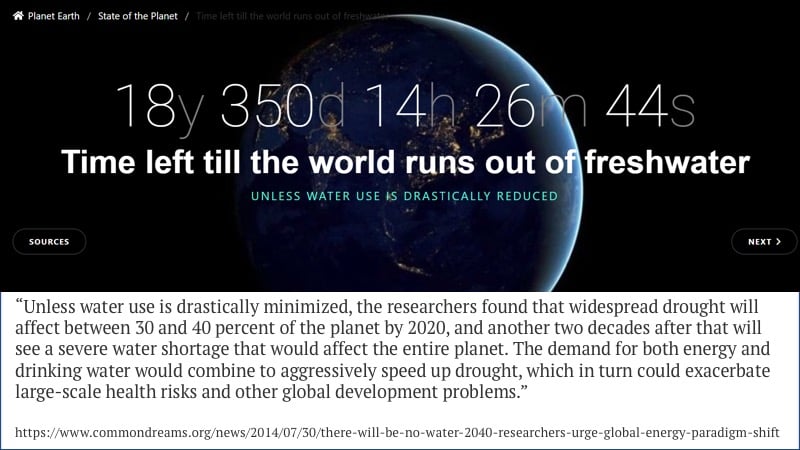
Terrible Deadline
Okay. This counter, roughly 19 years before the world runs out of fresh water. What's that all about? Well, it turns out that a widespread drought will affect 30 to 40% of the planet right now, 2020. This is obviously, it was written in 2014, so that's why it's got this 2020 date.
But it's currently happening. Widespread drought is currently happening in the planet. And then by 2040, two decades later, severe water shortage that could affect the entire planet. Demand for energy and drinking water will make it worse. Let's talk a little bit about how we can avoid this terrible deadline.
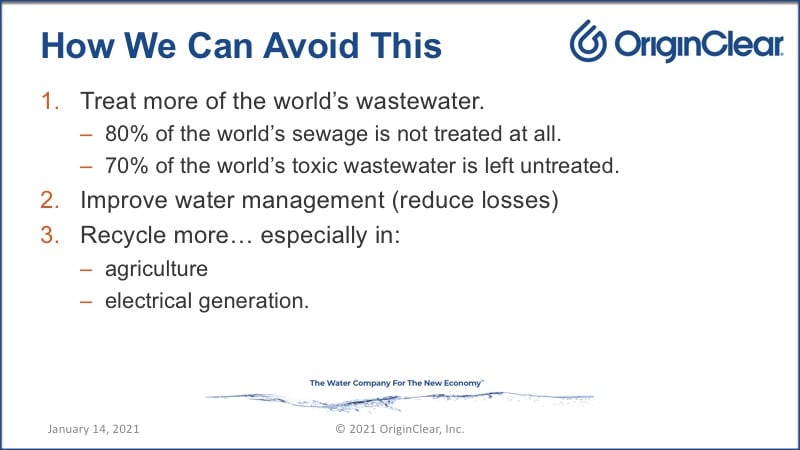
We Share the Same Oceans
First thing we can do is treat more of the world's wastewater. That's the easiest thing that can be done. Why? Because 80% of the world's sewage is not treated at all. Now you say, "Well, in the US, we treat a lot of our sewage." And it's true. We treat more like 80% of it, and maybe only 20% is not treated. So it's flipped.
But there are countries where there's nothing treated, so you get huge parts of the world where there's very, very poor treatment. And the average means... You know, and we share the same oceans. What is dumped in a country in Africa, whatever, eventually gets to our shores. And industrial wastewater, toxic wastewater, also, a tremendous amount is untreated. So if we can make progress there, that's a huge gain right there.
Improve Water Management
Secondly, improve water management. Reduce losses. I'll get into that in a second. That's an important one, because our water main's leaking and so forth. And finally recycling. Now the report that gets into all this, it was, you know, the world running out of water, et cetera, et cetera. When will the world run out of water? And it gets into what's happening.
Recycling
Well, it's because, they say, because of production of beef and energy and this and that. And it's absolutely true. But there is no particular reason why you can't recycle, for example, the water being used for a power plant. There's no need to dump the water. And for example, in Israel, they've achieved almost 90% of the water usage of recycling. They just turn it around. So the assumption that... I mean, I completely agree, we should go to clean energy and so forth. But just because someone is running a conventional power plant doesn't mean they can't recycle the water.
So that's a very important other requirement, is to recycle more. Agriculture, again, agriculture is a huge, huge users. 60 or 70% of use in places like California is agriculture. Well, if they recycle better, then that's less of a problem. And similarly, the electrical generation is a big water user. Recycling is harder, because you've got to put in systems, et cetera. So this is the order in which we can get these things done. Let's take a look at some of the stats. How can we treat more of the world's wastewater?
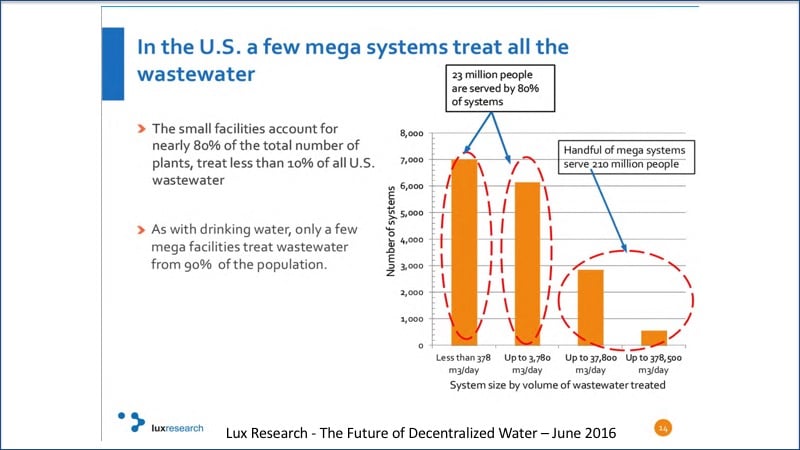
Maintaining the Mega Systems
Well, in the U.S. anyway, we've got huge mega systems. Only a few mega facilities treat wastewater for 90% of the population. So this was in the early part of the 20th century. We built these vast systems. It was the big new deal in giant concrete systems, the Hoover Dam and so forth. And that was great. But you have to maintain it, right?
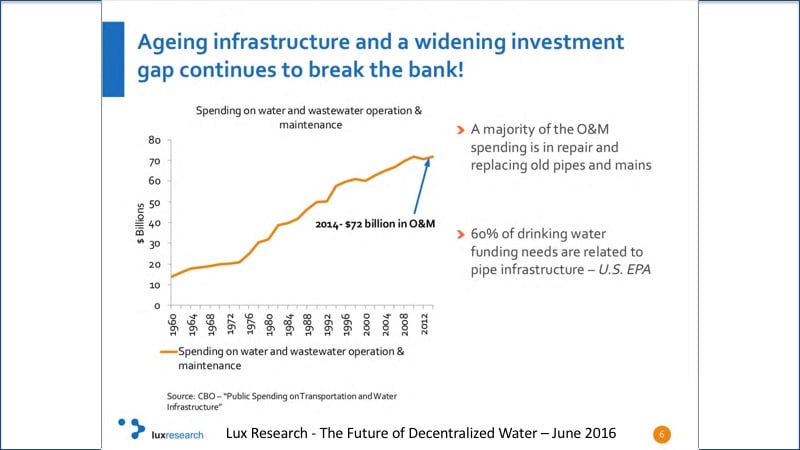
Rising Cost
They haven't. In 1960, the degradation of the infrastructure began, and operation and maintenance expense rose and rose and rose and rose. And in current dollar terms, it went from roughly 15 billion to $72 billion a year in 2014, and it's gotten worse. So that is a problem.
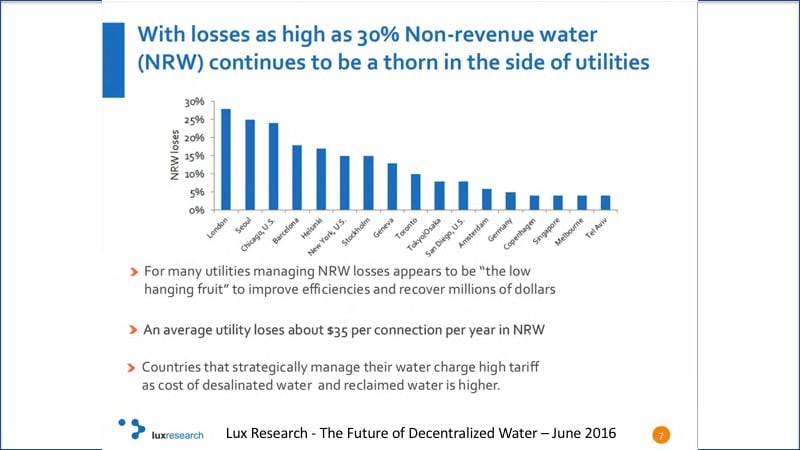
Non-Revenue Water
And that also means losses of water, what's called non-revenue water. That means water that the water utilities don't make money from. Well, it's also water that's lost, that goes into the ground. Now, it varies. Tel Aviv does a great job. Singapore, Melbourne, these are very good locations, but look at London, almost 30%. Seoul, Chicago, New York is around 17%. So these are major gains that can just be, you know, by improving literally the pipelines and the pump stations, which is a major business of ours. So that's important, too.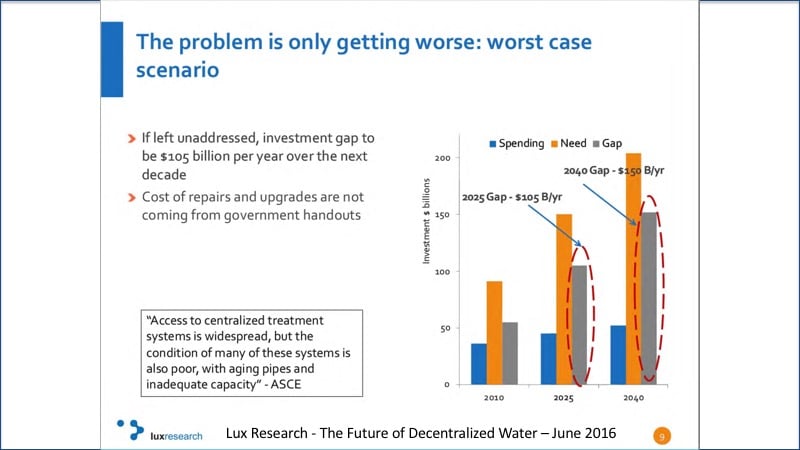
Problem Getting Worse
Now, here's what's important. The problem's getting worse. It's over a hundred billion dollars a year of spending gap. That access to centralized treatment systems is widespread. Everybody can get to them, but the conditions is poor. What's happening, as the condition of the pipe is poor, the capacity of the central systems to handle it is reduced.
Now, you say, well, why don't we just have the government fix it? We have these big infrastructure bills coming. I'm quite sure this is one great thing about the ... I know the new administration has already promised a huge stimulus, et cetera, but we saw in the last recession, 2008 recession, that the government had a very hard time spending that money. They had an easy time throwing money into the system, but actually doing things with it was very, very hard, it turned out. And this is the kind of thing that ends up.
Becoming Self-reliant
Can government fix it? Well, here is a train to nowhere. This is the California high-speed rail project, which is sitting in the middle of the Imperial Valley in California, and it's not being built. And we're already spending billions and we haven't even built much. Look at the LA metro system, the subway system, which went billions overcharged.
So what happens when you don't do these infrastructure? Let's take travel, for example. If there isn't a good rail system, then what are you going to have? Well, you'll have something, and it's probably the Google self-driving car, right? Because we already have freeways. So things go to the edge. Things become self-reliant. You don't realize it, but more and more computing, of course, is being done in your hand, as opposed to in the central mainframes. It's more efficient in a way, because you have access to all this computing power.
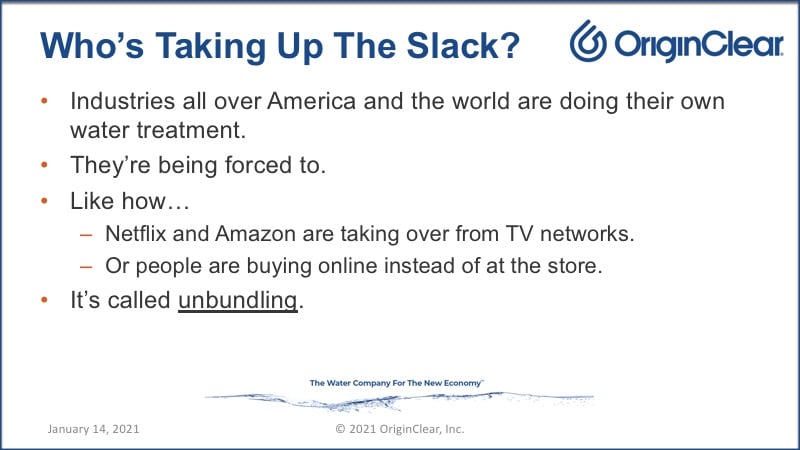
Unbundling Water Services
So government, not going to help well. Well, who's going to take up the slack? Well, it's just not a well-known trend. People are not realizing it, but industries all over America and the world are starting to do their own water treatment. And this is really a form of unbundling, where, for example, you have all the streaming services taking over the different TV networks. Online buying is cutting down tremendously on people going to Macy's and so forth.
And so the unbundling of water services is a big deal. And what's strange about it is, is that nobody really wanted to do it. People were perfectly happy with the central municipal water districts doing the work, except they started failing and telling the users, you all can only give me clean water, treated water, and well, that's what businesses are in the business of now.
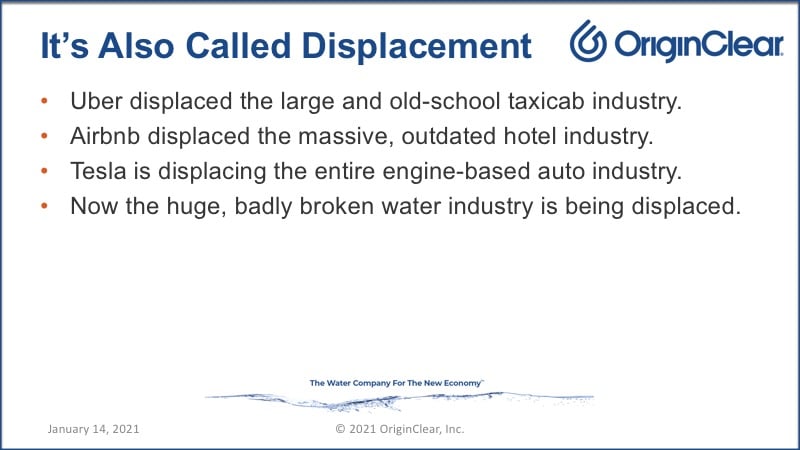
Displacement
It's also called displacement. Just as Uber displaced the taxi cab industry, Airbnb, the big, old school hotel industry, Tesla, we're seeing, is just, it's worth more than most of the industry combined, because why? It's the new thing. An electric car is far more simple and it has fewer moving parts and all that. So as big displacements happen, same thing has now happened with the water industry.
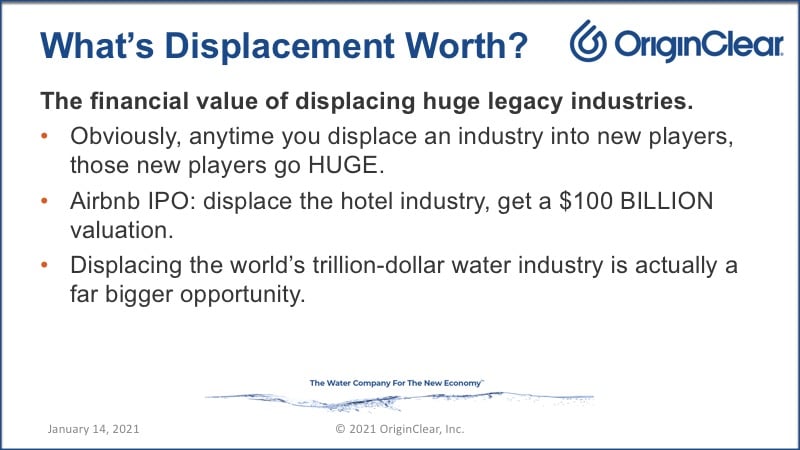
Happens at the Edge
Well, what does that mean? Well, think about it. When you take a gigantic existing industry and you displace it, well, take a look, for example, I just thought about this, commercial real estate. You have all these skyscrapers in New York City and millions of cubicles, of office space in Manhattan and Chicago, cities throughout America. And now it's being displaced into your home office.
Well guess what? That's a huge displacement, and things happen at the edge. For example, Zoom took off because of this displacement. Well, and good example was Airbnb, which went public late last year and is now worth about $108 billion. So, and compared to hotels, water, the water industry, which is estimated to be worth about a trillion dollars globally, is in a way much, much, much bigger, and I could argue much more important to our health and our future, as that countdown showed us.
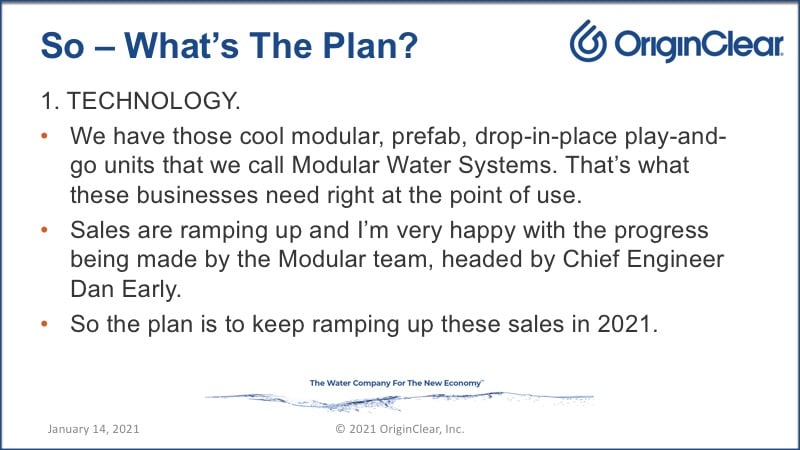
Water System in a Box™
All right, so what's the plan? What are we going to do? Well, one thing we have developed is technology. You know that we spent a good deal of our time in the early years of OriginClear developing our own filterless technology, but what's been more successful in recent times is a technology we acquired in 2018, which we branded as Modular Water Systems™.
And that's those drop-in place, prefab systems, exactly what businesses need. I remember a year and a half ago when a high-end hotel chief engineer contacted Tom Marchesello and said, "That thing you have, that box thing, we want that. We want the box."
Businesses don't want a lot of hassle. They don't want to make a career out of building water systems. They just want to have a box somewhere on their property that handles the problem. If it's a brewery, they want to have a brewery system that cleans the wastewater. It's in a corner. It does its job. Remotely managed. Everything's good.
Ramping Up
And so that has been increasingly successful. Now, sales are ramping up. What do I mean by that? Well, I can tell you that just in rough terms, I can't discuss recognized revenue yet, because it takes time to get that done for 2020. But I know that cash that was taken in by the entirety of Progressive Water and Modular Water Systems was about half a million dollars ahead of, it was about four and a half million dollars, so about half a million dollars ahead of our average, which is very good.
Now, Modular Water achieved about $735,000 in orders, which is fantastic, because there's only two people in Modular Water Systems. They're leveraging, of course the people at Progressive Water.
Added on Top
And so it's really, when I was ... years ago, I was an officer on cargo ships and you had a certain amount of base load that you traveled with that paid the bills of the ship, and then you had that little extra. And every single small, additional cargo you could carry was pure profit and I used to spend a lot of time as a chief officer, as a first mate on these ships, calculating very carefully how many more rows of, for example, bags of this dry coconut we could put on top because it represented more and more and more and more profit at that point.
Well, this is what Modular Water systems is. Progressive Water is paying its bills already with its regular custom fabrication business. Modular Water Systems is just added on top of that. So I think that we're going to do it very well in the new year and start to really accelerate. I saw the other day that Dan had about a $12 million pipeline of opportunities. I'm not going to say he's going to get them all, et cetera.
His main problem is literally servicing all those opportunities. He's working extremely hard with his team. So he and Robb are very hard at work supported by the Texas team. Okay, so that is the technology side and it's important. But here's the thing. It'll be incredible if we double, if we go to eight or nine or 10 million next year, and I mean this year 2021. That's not enough. We got to go much, much faster, and that's where the second part goes.
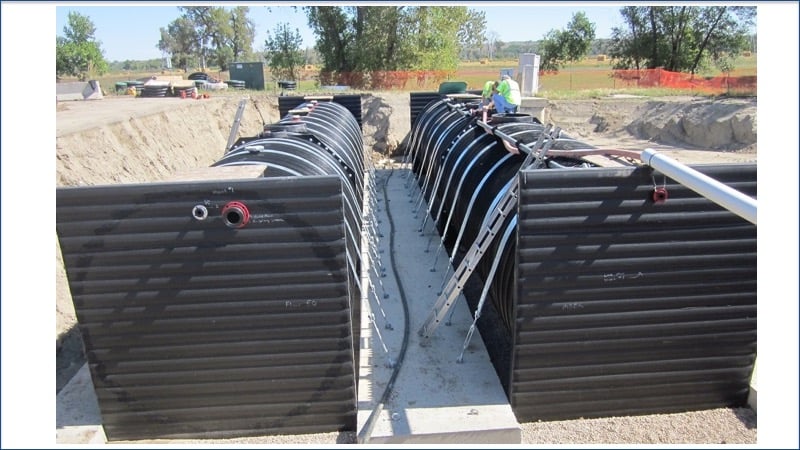 A Dan Early Water System in a Box — 40,000 GPD wastewater treatment plant
A Dan Early Water System in a Box — 40,000 GPD wastewater treatment plant
Designed to Last
Meanwhile, here's a picture of one of those modular systems. What's great about them, and this was the genius of Dan Early and why he's got these five patents. He figured out how to use sections of pipeline. And these are very durable. Obviously pipelines are designed to last 100 years.
So, these water systems are literally just drop them in the ground, strap them down and you're set. And inside there, there's the all whole hallways of equipment and it's a regular water system, but it's very quick to implement. And this was from Dan's personal collection showing us some of the stuff he's done in the past, and we're doing more of those now.
Becoming a White Knight
Okay, so how do we really speed things up? How do we go into high gear? That's the question. In 2020, Ken and I realized in early February, just before my birthday, which was that there was a real problem. The real problem with what was happening in Wuhan at the time, we didn't realize it was going to spread so intensely.
But Wuhan alone is such a heavy user of manufacturing resources. We saw the price of oil crash. I think the week ending, I think it was January 27th. Things started getting hit and we realized that things were changing. And we took a long, hard look at how we were going to expand.
And after weeks and weeks of working hard at this, we realized that the one big factor is funding. If we can transform funding, if I can tell you, "You're project's funded go," well then all of a sudden, I'm not a salesman. I'm a white Knight. So this is where OriginClear becomes a white Knight. Let's talk about that.
OriginClear Financial™
Funding. You know, the old school thing municipalities have had and still have, they can go to Wall Street get bonds, municipal bonds and widows and orphans invest in municipal bonds, tax benefited and so forth. So it's very easy to raise money for water projects if the voters will approve them.
But now that the users are inheriting the problem, they don't have that kind of capital. They can't go to Wall Street and get a bond. They have to figure out how to fund it. So this makes it slow. So, we said, "Well, why don't we make it happen?"
And so we're creating an in-house captive organization, which is able to finance that whole well, remember if you've ever gone to buy a car at a place like GM or Toyota, they will finance it in-house. They'll do their own leasing, they're own payment programs, et cetera. They have basically their own bank.
More of a Rental Model
And so this is what we want to put in. We want to fund these private water systems and then the businesses pay just how they used to pay the city with the meter, right? And this is a model that's been well piloted in the solar where you've signed what's called a power purchase agreement, a PPA for say 15, 20 years.
You're going to pay the utility bill and that finances the solar panel. You don't have to pay for it. Very similar here. The beauty of OriginClear Financial is that our systems remember are roll in, rollout. If somebody isn't paying, guess what? We take it back. And that's a huge thing because now we can do more of a rental model.
We don't have to worry so much about how good people's financials are, because we can always take it back. What's called the Rent-A-Center model. Rent-A-Center is you can rent a TV very easily. You just go in and you can show that you have a paycheck and boom, you got it. You get yourself a TV, and then you fail to make the payments. Guess what? The TV goes back to Rent-A-Center. That is the faster way to go, if you can somehow do it. And that is where our technology is key.
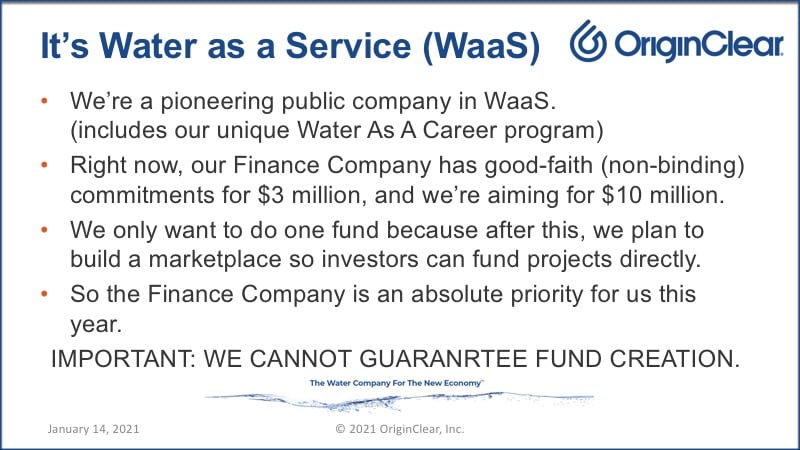
Water as a Service
It's got a term, "Water is a Service." We're not the only player in it. There's a good private company that I admire tremendously called Cambrian Innovation, which has done a good job with this. But they're private, right?
So, and there are public companies playing with water as a service, but they're doing many other things besides. A company like Veolia, for example, does mostly municipal work, right? American Water Works, these people frankly, work with a lot of old school.
So, we're what you might call a pure play. We will be at least, as we start rolling out Water as a Service and the subset of this great Water as a Career thing that we put together last year, which is a subset of it where we can put COVID affected entrepreneurs into the water industry, and they can become mini water companies selling these systems. And with our financial backing, they don't have to make the customer pay up front. They say, "Here, sign on the dotted line," et cetera.
One Fund
Now, the finance company I've told you before that we have commitments that are non-binding for $3 million so far. One for one million and one for two million. I'm meeting, as I was mentioning in last the briefing, with a potential investor for 12 million. There's another one for we think 700,000. So we'd like to make it a million, a million dollar minimum.
If you're going to invest 500,000 or less, you're better off in our regular offering. Now we're only going to do one fund and this is very important. Let's say we do a $10 million fund. We finance all these systems and now we just, we run the program, and as soon as we've got all these systems financed, then it just sits there and makes money for the investors.
Mature Model
Great. What I believe we need to do is export it to a marketplace. Marketplaces are the only way to scale. Think about it. We're not that huge a company. Well, even if we were a very large company, we couldn't handle the entire planet. But a marketplace like an Airbnb, for example, it could scale unlimited because all you're doing is doing the transaction management, making sure that there's that people aren't being ripped off and all that stuff. There's quality. Well, that's a, well-known technology. Uber and Airbnb and people like that have pioneered that. It's very mature.
So I believe that the real exciting part of OriginClear is to end up eventually with a marketplace. I've talked about this before. The only difference is we're starting it for ourselves. So this finance company is absolutely our first priority this year and it's well underway.
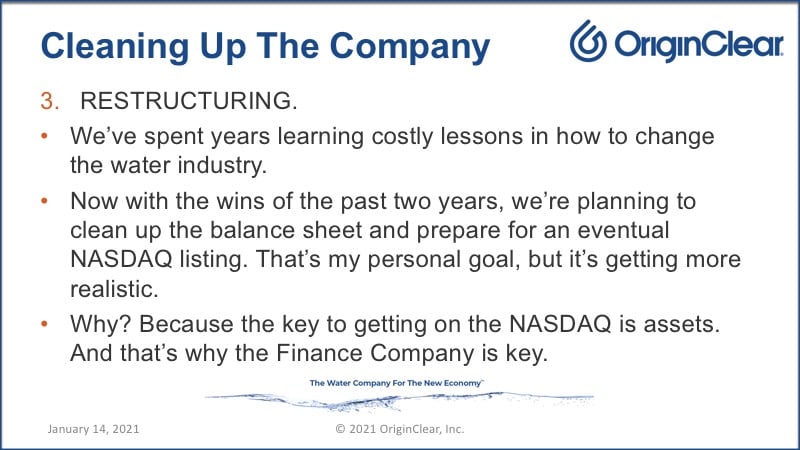
Restructuring
Now there's a third major piece to our plan, and that is restructuring. You can see the tire marks all over me. We have spend a lot of years learning how to change the water industry, building technology, acquiring companies, building what is now a very strong team.
Well, we need to clean all that up, get ready for what I personally believe is going to be a NASDAQ listing. I hope it's going to be this year. I can't guarantee it, of course. The key thing has always been, how do we get the assets? Because stock price is doable. All the other things are doable. Number of shareholders, there's a number of requirements. But assets, you got have assets. Well, if you've got a fund and you own the fund, then you've got the assets. So, that's a very important part of it.
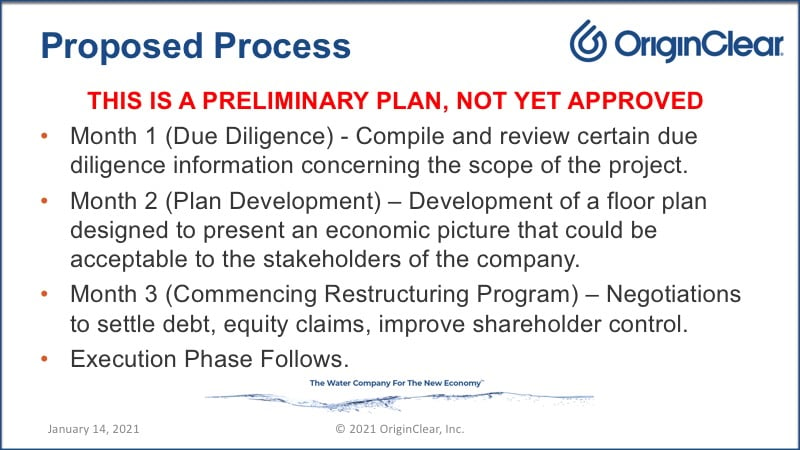
Stages of Restructuring
Now I'm also going to quickly talk about what the stages are, the restructuring. This is not an approved plan. This is something we're reviewing, but this is very standard. You have three months of due diligence, which is just completely laying out everything about the company what's going on, where the problems are, what to handle and so forth.
Then we develop a plan in month two, and it's called a floor plan. It lays out what is the economic picture? What is the company going to look like post restructuring? And finally we settle all of the debt. Very important, improve shareholder control. We have some amazing shareholders in the company who have been super loyal, and of course we take care of our shareholders.
Execution Phase
After that you get the execution phase. Well, what is the execution phase? With these three months worth of work done, and these are just estimates, you now have a company that's very attractive to investment banks. And so you can put in place certain commitments. I'm not going to get into them on the air like this, but you can get people to commit to certain things that can happen once you're on the NASDAQ and so forth. This is extremely tentative talk. I'm just giving you sort of a sketch of what is planned.
Gaining Support
The other thing that has to happen is guess what? When you move to a higher exchange, you're no longer a penny stock, you're going to have, $4 stock, whatever different kind of investor. I'm going to have to go roadshow. And if we still have COVID problems, I'll be doing it on Zoom to all the analysts. Oppenheimer, people like that who are key to recommending a company's technology and it's business. So you have to get support because it's one thing to get on the NASDAQ, but you got to stay there. And that's where it's very important that you have all the support and a good support by one or more investment banks, et cetera.
Three Pillars
So it takes time. This is why I certainly can't guarantee this for 2021. I hope it'll happen, but there's a lot to be done. The important thing to know is that regardless of this plan, we are planning to execute on the fund. And even without the fund, number one, technology — we are making wins and conquests of the technology. So these three pillars of 2021, I believe will create a world-class company. And I think there's a lot of potential there.
Well, here's the participating in our future slide. Ken Berenger has been my close collaborator. He is really, really in the loop.
Schedule with Ken
And if you click on oc.gold/ken, you'll see this little screen and you go ahead and you schedule. His time is being locked up fast. I can hardly talk to him. I usually have to just text him. So, I would strongly recommend if you're an accredited investor or you're a non US investor, talk to Ken and he'll be happy to discuss what this is all about, share some of the thoughts we've had.
Because I say he has been my collaborator in so many respects along with of course, Tom Marchesello, our Chief Operating Officer, Dan Early, our Chief Engineer and the rest of the team, Marc Stevens, the President of Progressive Water. I'm so proud of the team and they've really been real survivors.
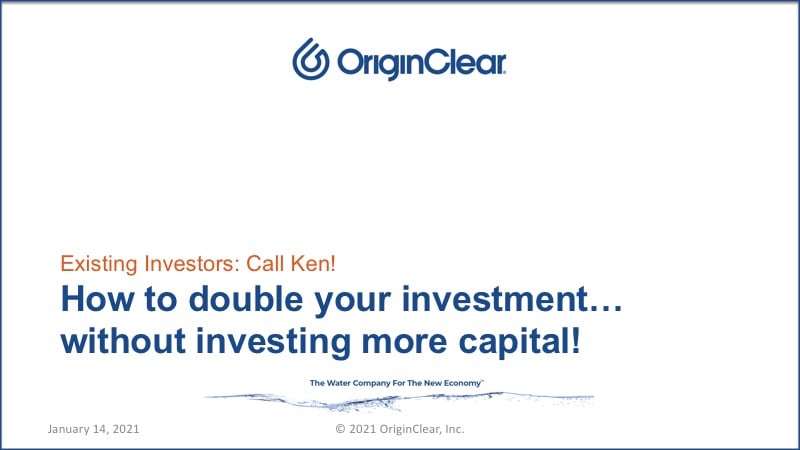
Double Your Investment
One more thing I want to mention is that if you're an existing investor who is in already as an accredited investor, give Ken a call. There's a way to double your investment without investing more capital. I will say no more, because all the fun is in letting Ken brief you about it. So, these briefings are relatively shorter, but I hope that they were helpful to you. You can always email invest@originclear.com and Devin will make sure that I get the email.
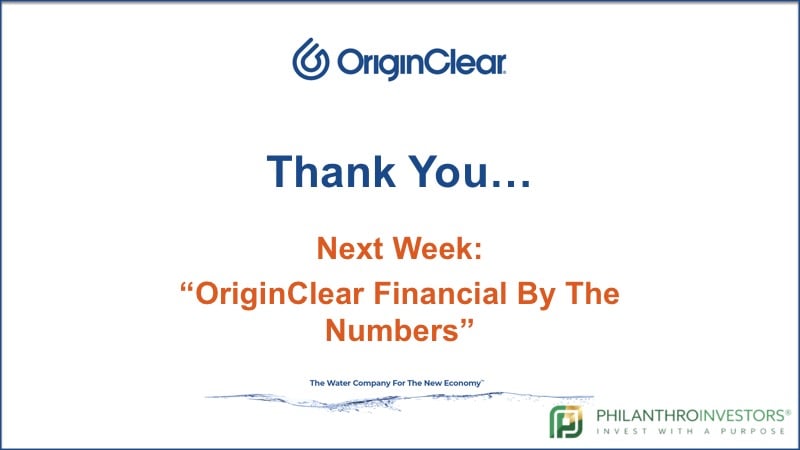
Next Week
Next week, I'm going to dive into OriginClear financial much more. We're going to go through spreadsheets, I'm going to show you how all the moving parts work. I think you'll love it. It's going to be very interesting. I'll have more news about what Philanthroinvestors® is doing for us, which amazing things coming from Ivan Anz and Arte Maren and the international team. They are really helping us make it happen and we're so grateful. So it's going to be a good one next week. I hope you join.
Anyway, it's been wonderful talking to you guys. Thank you very much. I do hope to see you next week. And again, if you have any comments, please go ahead and email me. And what do we got here?
Questions and Comments
Darrell Polson wants to know, "Are you looking at using SPACs?" A SPAC is a special purpose corporation that basically it's a blank check corporation. And the answer Darrell is no. We have a great corporation. What we are going to do, we believe is, we believe we're going to create a special purpose entity, a corporation that we wholly own, which is going to own the fund.
So yeah, you could call it a special purpose, a company for that reason. But we're specifically going to take one of one of our companies this on the shelf that we have to have and this is what I think we'll do, I'm pretty sure. Create a company that's essentially going to be a bank.
Keith Roeten, "Thank you for coming through with everything that you tell us, this is going to be an extremely exciting year." We'll thank you, sir. You are one of our strong pillars. And Paul Fetcher, our king of real estate, who therefore he has the most exciting job in America says, "Wow, got to come back next week." Well, please do. Thank you all. Spread the word. Have a good evening. Enjoy the weekend.
Thank You!
Register for next week’s Insider Briefing: HERE
%20250px.png?width=250&height=53&name=OriginClear%20Logo%202019%20(RGB)%20250px.png)


